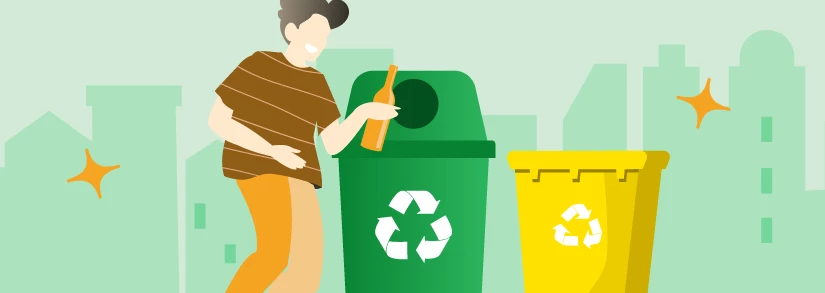Dublin Recycling Centres: Locations & Allowances

Recycling Dublin's waste has been a priority for Ireland year-on-year. But where can you bring your recycling? What materials does the city of Dublin accept? Find out about this and more in our complete guide to recycling centres in Dublin.
How does Recycling Work in Dublin?
There are three main ways to handle your recycling waste in Dublin for materials that can't go in your household bins:
- Bring them to a Dublin Recycling Centre (also known as Civic Amenity Sites)
- Use Dublin's Bring Centres (unstaffed collection points)
- Use your contracted Bin Collection Company's recycling bin
We will cover each of these options in further detail below.
Dublin Recycling Centres
The Dublin recycling centres are designed to offer additional options to those who are looking for further methods of waste disposal or recycling.
These sites accept a range of materials from common plastics and cardboard to bulkier white goods and electronics.
Using such facilities should be a staple thing for all Irish families.
The three primary recycling centres in Dublin are:
- Ringsend Recycling Centre (Dublin City)
- Ballymount Recycling Centre (South Dublin)
- Coolmine Recycling Centre (Fingal)
These facilities are generally free to use for core recyclables, however, if you are looking to dispose of unusually sizeable items or a large volume of waste, the recycling centre may charge a disposal fee depending on the centre's specific waste handling capabilities.
These centres are also staffed and can provide guidance regarding the disposal of the items you have brought. Some Dublin recycling centres also offer additional services, such as the sale of recycling bins, bin bags and other similar items.
What Materials Can I Bring to a Recycling Centre?
First, it is important to note that none of these recycling centres accepts any type of commercial waste nor do they permit large commercial vehicles on the premises.
Here is a list of the items you are permitted to leave at these recycling centres free of charge (for household users):
| Paper | Cardboard | Tetra Pak |
| Glass (bottles and jars) | Cans (steel and aluminum) | Plastic Bottles |
| Clothes / Textiles | Batteries | Plastic Packaging (clean and dry) |
| Mobiles | Lightbulbs (fluorescent, LED) | Books / CDs / DVDs |
| Fridges / Freezers | Electronics (IT equipment) | White Goods (washing machines, dryers, etc.) |
| **WEEE** (Waste Electrical and Electronic Equipment) | Polystyrene | Brown Goods (TV, radios, electricals) |
These recycling centres will also accept the following items for a fee.
Contact the corresponding centre to know the amount of the charge, as prices may vary between local authority areas.
| Furniture | Mattresses | Gas Cylinders (limited types) |
| Engine Oil | Cooking Oil (small amounts) | Construction waste (e.g. rubble, plasterboard) |
| Flat glass (e.g. window glass) | Food waste (for domestic users) | Green waste (garden clippings) |
| Steel (scrap metal) | Paints (waste paint) | Aerosols & Pesticides (hazardous household waste) |
Other waste and refuse you can dispose of at one of Dublin's Recycling Centres for a fee (prices based on Dublin City Council 2024 rates):
| Item | Cost | Item | Cost |
|---|---|---|---|
| Car (Entry Fee) | €15 | Jeep / SUV (Entry Fee) | €20 |
| Car Trailer (Entry Fee) | €40 | Van & Double Axle (Entry Fee) | €70 |
| Green waste 80L bag | €2 | Green waste 1m³ Skip bag | €16 |
| Domestic waste 80L bag | €4 | Kitchen caddy 10L | €2 |
The following items are not accepted in Dublin's recycling centres:
- Tyres
- Oil tanks
- Petrol and diesel
- Asbestos
- Commercial Green waste
- Any commercial waste (business use)
How to Find your Nearest Recycling Centre?
Before you make that journey out to your nearest recycling centre, it is worth checking ahead that they are open, what they accept, and what alternative locations you have.
This is particularly important if you have unusual items, or have recently moved home.
There are six main recycling centres in Dublin which are spread across the city limits (Dublin City, Fingal, South Dublin, and Dún Laoghaire-Rathdown). The table below lists the recycling centres' opening hours, locations, and contact information.
If these appear too far from your home, don't forget to look at the city's Bring Centres which also collect common household items free of charge.
We outline details about these in our "Dublin Waste Collection & Dump Options" guide.
| Name | Hours | Contact Details | Address |
|---|---|---|---|
| Ringsend Recycling Centre | Mon - Wed 9 am - 5 pm Thurs - Fri 9 am - 6 pm Sat & Bank Holidays 9 am - 4 pm Closed Sundays | Tel: (01) 614 4750 Email: [email protected] | Pigeon House Road, Ringsend, Dublin 4 |
| North Strand Recycling Centre | Mon - Fri 10 am - 4 pm Saturday 10 am - 1 pm Closed Sundays & Bank Holidays | Tel: (01) 836 4716 Email: None | 1 Shamrock Terrace, N Strand Road, Dublin 1 |
| Ballymount Recycling Centre | Mon - Fri 9 am - 5 pm Saturday 9 am - 5:30 pm Sunday & Bank Holidays 9:30 am - 5 pm | Tel: (01) 462 1251 Email: [email protected] | Ballymount Avenue, Dublin 24 |
| Estuary Recycling Centre | Mon - Fri 8 am - 8 pm Saturday 8 am - 6 pm Sunday & Bank Holidays Closed | Tel: (01) 890 5985 Email: [email protected] | Seatown East, Swords Dublin |
| Coolmine Recycling Centre | Mon - Sat 9 am - 3:45 pm Sunday & Bank Holidays Closed | Tel: (01) 890 5986 Email: [email protected] | Coolmine Industrial Estate, Dublin |
| Ballyogan Recycling Centre | Mon - Fri 8:30 am - 5:30 pm Saturday 9:30 am - 5:30 pm Sunday & Bank Holidays 10:30 am - 5:30 pm | Tel: (01) 291 3600 Email: [email protected] | Ballyogan, Dublin |
If you would like to delve deeper into these recycling centres, Dublin City Council has a great search facility on their website to enable this search with ease.
To access this, all you have to do is follow these steps:
- On your preferred browser, input dublincity.ie. This should bring up the council's website
- Scroll down, and click on Waste and Recycling
- Click on “Find a Recycling Centre”
- A map of locations within Dublin should appear. Click on the locations near yourself to find out the centre details
- If you want to narrow down your search, you can filter the results by selecting glass, paper, or textiles from the drop-down menu
- If you prefer a list of locations rather than the map, select the “Hide Map” button
- After selecting your location, the page will load a list of what items they accept, their opening hours, additional charges, and conditions of use
What are Bring Banks?
These are unstaffed collection points for limited recyclable materials such as food cans, glass bottles, and unwanted clothes. Often dotted around towns and cities, these facilities are free and simple to use.
Civic Amenity Sites
Civic amenity sites fulfil a similar role to bring banks and recycling centres but accept a much wider variety of waste such as DIY materials, oil, bulky items and more. These sites are also staffed and open for only limited hours throughout the day.
What are WEEE Centres?
WEEE centres (Waste from Electrical and Electronic Equipment) specialize in the processing and recycling of Dublin's electrical items. It is especially important to use these facilities for your old electronics or batteries as they may contain materials or substances that can be highly damaging to the environment if not disposed of correctly.
Recycling Waste From Home
If you have just moved home and are new to Dublin, it's important to know that, much like you would check for the best energy deal, you should take the time to compare waste collection or recycling companies Dublin can offer you.
Here are just a few factors to consider when looking for a waste management company to take care of your recycling:
- The size of the recycling bin you need
- The types of waste you wish to dispose of (glass, paper, other)
- The price of the recycling collection plan
Let's take a quick look at which items you can dispose of at home. While household recycling companies may have slightly varying requirements on what their bins can handle, as a rule, they largely conform to the details shown in the table below.
It is always worth double-checking with your supplier directly just in case you are still in any doubt.
| General Bin (Residual) | Recycling Bin (Mixed Dry) | Compost/Organic Bin | Glass (Bring Bank/Centre) |
|---|---|---|---|
| Vacuum Cleaner Contents/Dust | Newspapers/General Paper & Magazines | Garden Waste (Unless Chemically Contaminated) | Glass Bottles of any Colour |
| Broken Delph (Pottery/China) | Cardboard Boxes & Packaging | Dead Plants & Flowers | Jars |
| Soiled Food | Tin/Steel Cans | Hedge Cuttings & Grass Trimmings | Non-Food Bottles, e.g. Perfume, Aftershave etc |
| Unrecyclable Packaging (e.g., crisp packets) | Tetra-Pak Juice & Milk Cartons | General Food Waste Without Packaging | - |
| Contaminated Plastics & Polystyrene | Plastic Bottles (rigid plastic) | Coffee Grounds, Paper Filters & Teabags | - |
| Plasters, Nappies etc. | Plastic Film/Soft & Rigid Plastics | Cardboard & Paper if Soiled by Food | - |
While it can be tempting to throw recycling in whichever household bin is lowest, it is important to resist doing so.
Asides from resulting in potential environmental damage or rejection at the recycling centre, some companies have teams in place to check that homes have placed the correct materials in their bins, and may charge a penalty of up to €30 per instance of incorrect segregation.
Did you know? In 2023, Ireland generated over 1.2 million tonnes of waste in packaging alone! Be sure to do your part and help make Ireland that bit greener by recycling your packaging correctly.
Source: Environmental Protection Agency (2023 data)
Recycling Dublin Schemes
The local government has put in place several schemes to help increase the volume of recycling being processed within Dublin's city centre, along with the suburbs.
The #CircleCity campaign was first launched in December 2020, with the goal of making recycling facilities much more accessible to those within the city centre, particularly those looking for casual disposal while on the go.
As a result of this, 25 recycling bins were installed, resulting in an approximate 83% increase in plastic bottles and cans being recycled within the Grafton Street and Henry Street areas, which would have otherwise gone to landfill.
The Waste Action Plan for a Circular Economy is Ireland's roadmap for waste management and planning. Launched in 2020, this plan has the goal of ensuring that when raw materials enter the economy, they are reused and recycled as many times as possible before disposal, thus reducing the prevalence and damaging effects of single-use items and unnecessary waste disposal.
